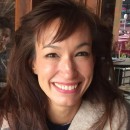Marie Mutsuki Mockett
Fiction, Nonfiction

- Biography
Biography
Marie Mutsuki Mockett was born to an American father and Japanese mother, and graduated from Columbia University with a degree in East Asian Languages and Civilizations. Her memoir, Where the Dead Pause and the Japanese Say Goodbye, examines grief against the backdrop of the 2011 Great East Earthquake, and Mockett’s family temple located 25 miles from the Fukushima Daiichi Nuclear Power reactor. Mockett’s awards include a Fellowship from the US/Japan Creative Artist Fellowship, funded by the National Endowment for the Arts. Where the Dead Pause and the Japanese Say Goodbye was a finalist for the 2016 PEN Open Book Award, the Indies Choice for Nonfiction and the Northern California Book Award for Creative Nonfiction. Her novel, Picking Bones from Ash, published by Graywolf, was a finalist for the Saroyan Prize and the Paterson Prize. Her new book, tentatively titled A Kernel In God’s Eye, explores her family’s one-hundred-year-old wheat farm in Nebraska, and the changing role of food, God, science, race and agriculture in society, and was a finalist for the Lukas Prize, awarded by Columbia and Harvard University’s Schools of Journalism. She lives in San Francisco.
Mentor. Workshops and classes in fiction and nonfiction.
Statement: I think of writing as intimately connected to seeing. I ask myself–and students–“What do you see that other people are missing?” As artists, we want to entertain and we want to be liked. But as artists who are also thinkers, we want to find those truths that other people are missing and perhaps even avoiding. It is the function of the writer in particular to say out loud those things people are afraid to mention. When I am stuck, I try to go back to the fundamental question: what do I see that I want other people to see? I also ask: what am I seeing that others are missing? This allows me to try to find something new in the world, and in my writing–and nothing brings about energy and motivation like the shock of what is new. I believe that every person has a distinct camera lens and this comes through in your writing. My job as your teacher is to help you focus that lens, and see in your own unique way–and then help you tell us all that you see. I am interested in mentoring anyone, but am always seeking people with a viewpoint we don’t see too much: working class, transgender, biracial, under-represented cultures, etc. Please come challenge me with something new.



Social Media